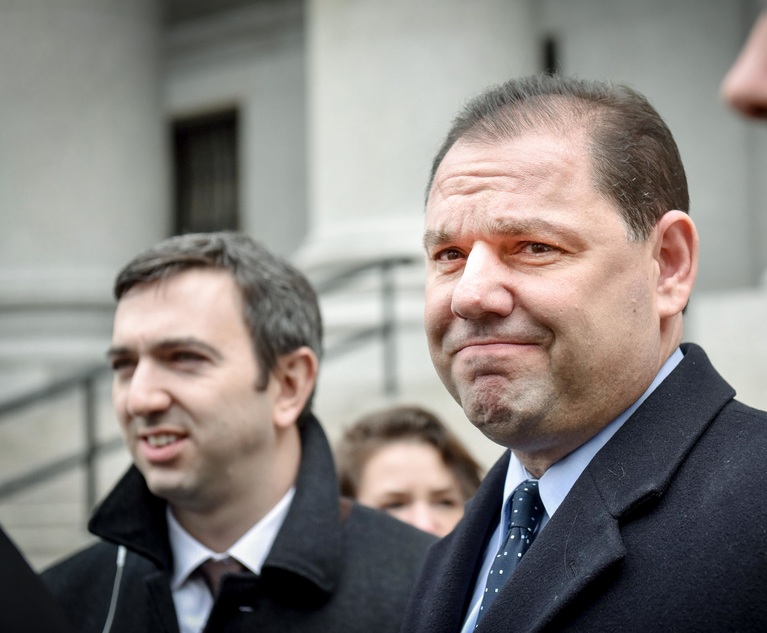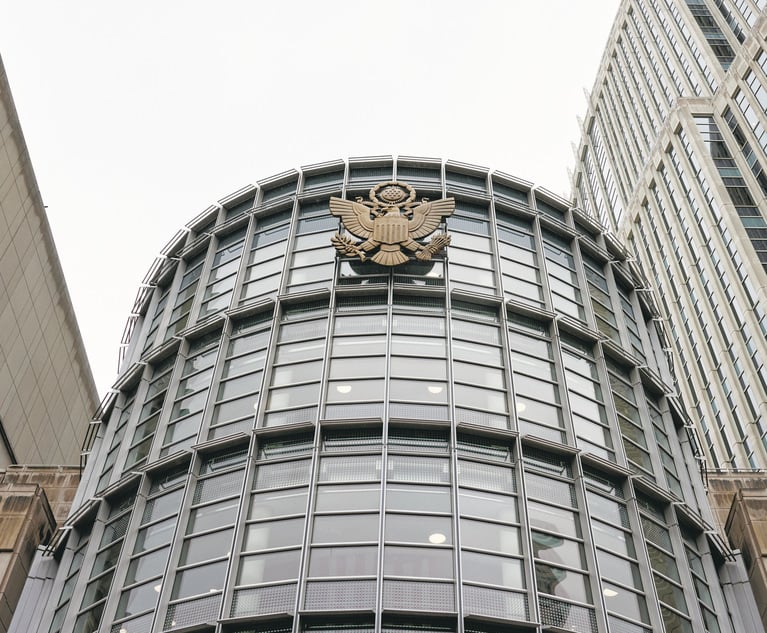 Joseph Percoco, a former aide to Gov. Andrew Cuomo. Photo by David Handschuh/NYLJ
Joseph Percoco, a former aide to Gov. Andrew Cuomo. Photo by David Handschuh/NYLJ Chastening the Prosecutor's Darlings? SCOTUS To Assess 'Right-To-Control' and Honest Services Fraud
In 'Ciminelli' and 'Percoco', the Supreme Court will have the opportunity to further limit prosecutors' use of unduly broad interpretations of the federal fraud laws to impose their own notions of an integrity code onto state government and many other arenas beyond their proper reach.
August 10, 2022 at 11:45 AM
13 minute read
Federal courts long have struggled to define the limits of the mail and wire fraud statutes, laws famously characterized as the prosecutor's true love for their vast breadth and catch-all adaptability. After sidestepping opportunities in the past, the U.S. Supreme Court is now wading into two different and controversial manifestations of that flexibility. The first, which has proved particularly useful to Second Circuit prosecutors in recent years, is the "right-to-control" theory. This approach treats the deprivation of complete and accurate information bearing on a person's economic decision as a species of property fraud. Critics have focused on this theory because it allows federal prosecution of a broad range of conduct that may be unsavory or deceptive—like violating NCAA recruiting rules, lying in an employment application or retaliating against a political rival by closing entrance lanes to a busy bridge—but which does not contemplate the concrete economic harm at which fraud statutes are aimed. The second is a line of cases based on the Second Circuit's 1982 decision upholding the conviction of the former Republican leader in Nassau County, Joseph Margiotta, holding that a private citizen who has informal influence over government decision making can be convicted of honest services fraud.
The cases the Supreme Court accepted for review arise from scandals touching New York state government that were the subject of two separate trials in 2018 before Judge Valerie Caproni of the Southern District of New York. On June 30, the last day before its summer recess, the Supreme Court granted a petition for certiorari in Ciminelli v. United States, No. 21-1170, often referred to as the "Buffalo Billion" case, arising from alleged bid-rigging regarding contracts for development projects in Buffalo and Syracuse. That same day, the court also granted a petition for certiorari in Percoco v. United States, No. 21-1158, which stemmed from a bribery scandal involving one of the defendants in the "Buffalo Billion" case and Joseph Percoco, a top aide to then Governor Andrew Cuomo who was not a state employee at the time of the conduct at issue. Coming in the wake of Kelly v. United States, 140 S. Ct. 1565 (2020)—the court's unanimous ruling rejecting an expansive construction of the fraud statutes in overturning the "Bridgegate" convictions—the court's decision to hear both cases suggests it may take the opportunity to further rein in prosecutors' efforts to impose their views of ethical behavior by extending the fraud statutes beyond protecting against classic property fraud.
This content has been archived. It is available through our partners, LexisNexis® and Bloomberg Law.
To view this content, please continue to their sites.
Not a Lexis Subscriber?
Subscribe Now
Not a Bloomberg Law Subscriber?
Subscribe Now
NOT FOR REPRINT
© 2025 ALM Global, LLC, All Rights Reserved. Request academic re-use from www.copyright.com. All other uses, submit a request to [email protected]. For more information visit Asset & Logo Licensing.
You Might Like
View All
Disbarred NY Atty Receives 54-Month Prison Sentence After $3M Embezzlement
3 minute read

Charlie Javice Jury Will Not See Her Texts About Elizabeth Holmes

'You Became a Corrupt Politician': Judge Gives Prison Time to Former Sen. Robert Menendez for Corruption Conviction
5 minute readLaw Firms Mentioned
Trending Stories
- 1ACC CLO Survey Waves Warning Flags for Boards
- 2States Accuse Trump of Thwarting Court's Funding Restoration Order
- 3Microsoft Becomes Latest Tech Company to Face Claims of Stealing Marketing Commissions From Influencers
- 4Coral Gables Attorney Busted for Stalking Lawyer
- 5Trump's DOJ Delays Releasing Jan. 6 FBI Agents List Under Consent Order
Who Got The Work
J. Brugh Lower of Gibbons has entered an appearance for industrial equipment supplier Devco Corporation in a pending trademark infringement lawsuit. The suit, accusing the defendant of selling knock-off Graco products, was filed Dec. 18 in New Jersey District Court by Rivkin Radler on behalf of Graco Inc. and Graco Minnesota. The case, assigned to U.S. District Judge Zahid N. Quraishi, is 3:24-cv-11294, Graco Inc. et al v. Devco Corporation.
Who Got The Work
Rebecca Maller-Stein and Kent A. Yalowitz of Arnold & Porter Kaye Scholer have entered their appearances for Hanaco Venture Capital and its executives, Lior Prosor and David Frankel, in a pending securities lawsuit. The action, filed on Dec. 24 in New York Southern District Court by Zell, Aron & Co. on behalf of Goldeneye Advisors, accuses the defendants of negligently and fraudulently managing the plaintiff's $1 million investment. The case, assigned to U.S. District Judge Vernon S. Broderick, is 1:24-cv-09918, Goldeneye Advisors, LLC v. Hanaco Venture Capital, Ltd. et al.
Who Got The Work
Attorneys from A&O Shearman has stepped in as defense counsel for Toronto-Dominion Bank and other defendants in a pending securities class action. The suit, filed Dec. 11 in New York Southern District Court by Bleichmar Fonti & Auld, accuses the defendants of concealing the bank's 'pervasive' deficiencies in regards to its compliance with the Bank Secrecy Act and the quality of its anti-money laundering controls. The case, assigned to U.S. District Judge Arun Subramanian, is 1:24-cv-09445, Gonzalez v. The Toronto-Dominion Bank et al.
Who Got The Work
Crown Castle International, a Pennsylvania company providing shared communications infrastructure, has turned to Luke D. Wolf of Gordon Rees Scully Mansukhani to fend off a pending breach-of-contract lawsuit. The court action, filed Nov. 25 in Michigan Eastern District Court by Hooper Hathaway PC on behalf of The Town Residences LLC, accuses Crown Castle of failing to transfer approximately $30,000 in utility payments from T-Mobile in breach of a roof-top lease and assignment agreement. The case, assigned to U.S. District Judge Susan K. Declercq, is 2:24-cv-13131, The Town Residences LLC v. T-Mobile US, Inc. et al.
Who Got The Work
Wilfred P. Coronato and Daniel M. Schwartz of McCarter & English have stepped in as defense counsel to Electrolux Home Products Inc. in a pending product liability lawsuit. The court action, filed Nov. 26 in New York Eastern District Court by Poulos Lopiccolo PC and Nagel Rice LLP on behalf of David Stern, alleges that the defendant's refrigerators’ drawers and shelving repeatedly break and fall apart within months after purchase. The case, assigned to U.S. District Judge Joan M. Azrack, is 2:24-cv-08204, Stern v. Electrolux Home Products, Inc.
Featured Firms
Law Offices of Gary Martin Hays & Associates, P.C.
(470) 294-1674
Law Offices of Mark E. Salomone
(857) 444-6468
Smith & Hassler
(713) 739-1250






